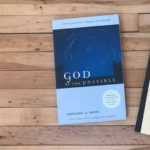We run our website the way we wished the whole internet worked: we provide high quality original content with no ads. We are funded solely by your direct support. Please consider supporting this project.
How do you respond to Isaiah 48:3–5?
The Lord proclaims to his idolatrous people, “The former things I declared long ago, they went out from my mouth and I made them known; then suddenly I did them and they came to pass. Because I know that you are obstinate, and your neck is an iron sinew and your forehead brass, I declared them to you from long ago, before they came to pass I announced them to you, so that you would not say, ‘My idol did them, my carved image and my cast image commanded them.’”
It is clear why the Lord is demonstrating his ability to control the flow of history. His people were “obstinate” (vs. 4) and were inclined to attribute things to idols (vs. 5). So he demonstrates that he is the sovereign Lord of history by declaring what he’s going to do before he does it. (Note, however, that the sheer fact that he denounces his people as “obstinate” proves that he isn’t a God who wants to control everything: he obviously allows these people to resist him.)
Some non-evangelical theologians today believe that God can’t predetermine or foreknow anything about the distant future. This school of thought is called “Process theology.” The Bible flatly contradicts this perspective. Passages such as this demonstrate that God is perfectly able to predestine and foreknow as much of the future as he chooses. Indeed, free agents are only free, and the future is only open, to the extent that God graciously decides it should be. This is why the God of the Bible (unlike the God of Process Theology) can guarantee that he will eventually be victorious over all who oppose him and that he shall accomplish his objectives for world history.
Passages such as these give us confidence that God is in control of things. He eternally knows all possibilities, he is never caught by surprise, and he is perpetually involved in human affairs as much as he needs to be in order to steer history to his desired end (Eph. 1:11). When he wants to—e.g. when people need to be freed from idols—the Lord can decide that he’s going to bring something about and then announce it ahead of time. Such supernatural feats prove his divinity. But the exception proves the rule: God does not normally act in this way. He does not need to exercise his power and reduce angels or humans to robots in order to attain his objectives. He only needs to exercise his infinite wisdom in steering these agents in the best possible way.
Category: Q&A
Tags: Open Theism, Q&A
Topics: Open Theism, Responding to Objections
Verse: Isaiah 48
Related Reading

Podcast: The Making of God of the Possible
Greg talks about making his book “God of the Possible,” then offers his initial thoughts on Thomas Oord’s book “God Can’t.” http://traffic.libsyn.com/askgregboyd/Episode_0468.mp3

How do you respond to Acts 4:27–28?
“[B]oth Herod and Pontius Pilate, with the Gentiles and the peoples of Israel, gathered together against your holy servant Jesus, whom you anointed, to do whatever your hand and your plan had predestined to take place.” This passage is very close in content to Acts 2:23 (see How do you respond to Acts 2:23?). While…

What do you think of Thomas Aquinas’ view of God?
Question: You have written (in Trinity and Process) that the relational God of the Bible is the antithesis of the immutable God of Thomas Aquinas. Could you explain this? Answer: Aquinas and much of the classical theological tradition borrowed heavily from Aristotle’s notion of God as an “unmoved mover.” God moves the world but remains…

How do you respond to Isaiah 6:10?
The Lord tells Isaiah, “Make the mind of this people dull, and stop their ears, and shut their eyes, so that they may not look with their eyes, and listen with their ears, and comprehend with their minds, and turn and be healed.” (cf. Matt. 13:14–15) If taken out of context this passage may sound…

How do you respond to Romans 8:29-30?
Question: Romans 8:29–30 says that everyone God foreknew he predestined. You deny both that God foreknows and predestines individual believers. So this verse seems to refute your open view. Answer: First, as many exegetes have noted, the sort of “knowing” Paul intends in this passage is not merely intellectual knowledge, but rather an intimate affection.…

What is the significance of 2 Samuel 24:17–25?
“So the Lord answered [David’s] supplication for the land, and the plague was averted from Israel.” The passage suggests that the Lord intended the plague to judge Israel further but David’s supplication persuaded him to change his mind and relent from his punishment. If the future is to some degree open and God is genuinely…
